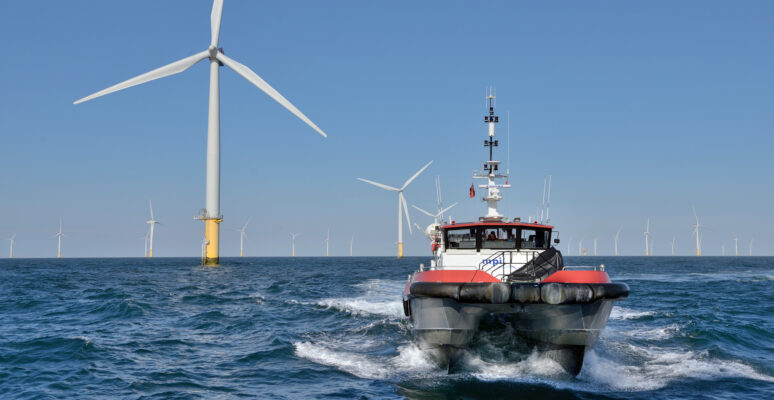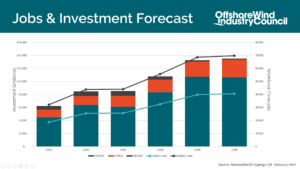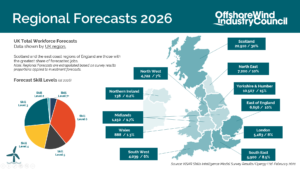
The University of Hull has welcomed the announcement that projections of direct and indirect jobs in the UK’s world-leading offshore wind industry are set to rise significantly, from 26,000 currently to over 69,800 by 2026.
Most of the jobs will be created in parts of the country which urgently need levelling up – including the Humber – says the report by the Offshore Wind Industry Council (OWIC) released this week.
The report, based on the most comprehensive survey ever conducted in the UK into the full extent of the economic benefits of offshore wind, also anticipates that the private sector will invest £60.8bn billion across the UK over the next five years. Investment will span developing, constructing and operating offshore wind projects as the industry expands rapidly in order to meet the Government targets of achieving Net Zero emissions by 2050.
Over 80% of offshore wind jobs are currently located outside London and the south east. Scotland currently has the highest proportion (30%), Yorkshire and The Humber has 15%, the north east of England 10% and the east of England also has 10%. The forecast detailed in the report shows that regional percentages will be maintained as jobs increase over the course of this decade, providing sustained long-term growth in these areas.

Equality, diversity and inclusivity (EDI) were also addressed in the report which noted that women make up 18% of the current workforce. However, the industry has committed to increasing this to at least one-third by 2030 – and to reach a stretch target of 40% if possible.
Welcoming the announcement, Louise Smith, Director of Aura stressed the importance of diversifying the industry’s growing workforce saying:
“This report predicts sustained growth in the offshore wind industry across the UK and is a welcome boost for the Yorkshire and Humber region in particular.
“With a third of the Humber’s economy based on high-carbon jobs, an inclusive transition to low-carbon energy is critical to the place and its people.
“At the University of Hull and Aura, we embrace the role we must play in ensuring the skills and training needs for the region – and in particular for those sectors and industries playing a vital role in our transition to a low-carbon future.
“It is also vitally important that we continue to encourage EDI in the offshore wind industry workforce to better reflect the diversity of our society and provide high-value career opportunities for local people.”

The wide range of jobs referenced in the report includes engineers, project managers, software designers, component manufactures, turbine technicians, welders, deep sea divers, boat crews and helicopter pilots. 79% of these jobs are highly skilled, technical and management roles. Apprenticeships make up 1.8% of the UK workforce, half of which are in Yorkshire and the Humber. The industry has committed to raising this to 2.5% as soon as possible.
The University of Hull is actively supporting the expansion of a skilled workforce through its postgraduate training portfolio in low-carbon and renewable energy.
This includes Masters programmes in Renewable Energy and Offshore Wind Energy & the Environment. The Aura Postgraduate Degree Apprenticeship in Offshore Wind Energy Engineering is additionally delivered through an innovative partnership with Siemens Gamesa Renewable Energy.
The University’s Energy & Environment Institute also leads the Aura Centre for Doctoral Training, in partnership with the universities of Durham, Newcastle and Sheffield and key sector organisations including the Offshore Renewable Energy Catapult and Siemens Gamesa Renewable Energy. Through its innovative blend of PGDip training, cutting edge research and continuing professional development, the Aura CDT is boosting the number of qualified individuals with the skills to support the expansion of the sector. A further 20 individuals will begin funded PhDs with the Aura CDT from September 2021, with applications opening at the end of March.
Professor Dan Parsons, Director of the University of Hull’s Energy & Environment Institute said:
“The University is at the heart of the Humber region’s drive to a Net Zero economy, providing the region and the nation with the skilled workforce for this low-carbon future.
“We recently re-launched our MSc in Renewable Energy, and through partnerships with the likes of Siemens Gamesa, Ørsted and the ORE Catapult, we are now recognised as a key stakeholder in the low-carbon sector. We are also ensuring that our programmes map to our research strengths in Net Zero and that our students have access to the cutting edge of the energy transition.
“The University is also committed to widening participation and improving equality, diversity and inclusivity in the renewables and low-carbon industries. It is part of our commitment at Hull to create a fairer, brighter, carbon neutral future for all.”
Developing the offshore wind supply chain is a key commitment in the Sector Deal; the industry is investing £100m over this decade on measures to ensure we increase the UK lifetime content of offshore wind farms from 48% currently to 60% by 2030.
The Offshore Wind Skills Intelligence Report was commissioned by OWIC’s Investment In Talent Group which was set up as part of the landmark Offshore Wind Sector Deal agreed with Government in 2019. The work has been done by RenewableUK, the National Skills Academy for Rail and independent data analysts Opergy Ltd.
Click here to download Offshore Wind Skills Intelligence Model Report Summary 2021-2026
